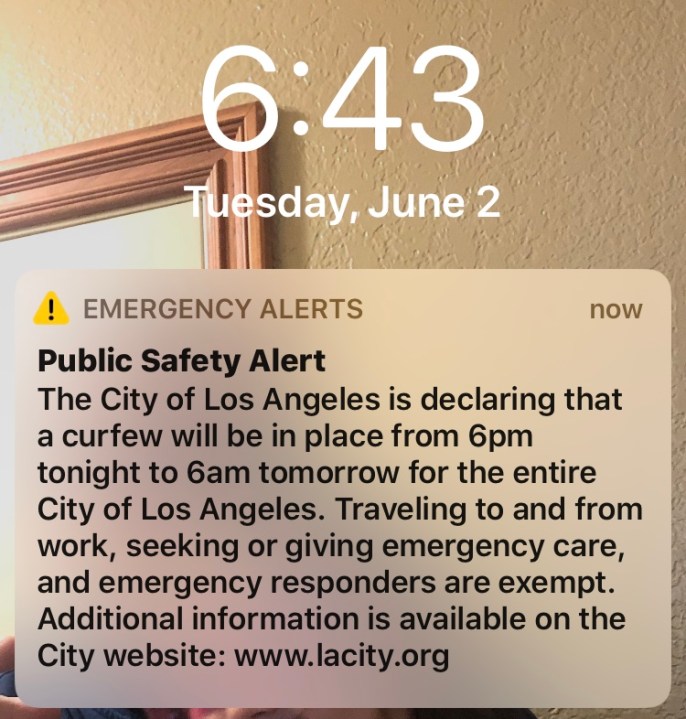The curfew in place across Los Angeles County amid peaceful demonstrations Tuesday will continue until “protests are gone,” Sheriff Alex Villanueva told KTLA.
But the American Civil Liberties Union says the curfew is not constitutional to begin with.
Cities across the region began issuing curfews over the weekend until local officials extended it to all of L.A. County starting Sunday night. People are expected to stay inside with the exception of commuting to and from work, or seeking or giving emergency care — beginning at 6 p.m. each night. The order does not apply to emergency responders.
On Tuesday evening, residents in the city of L.A. received an emergency phone alert indicating another curfew would go into effect Wednesday night.

“The curfew will continue on a daily basis until the organized protests are gone,” Villanueva told KTLA during a phone interview shortly before 5 p.m.
About an hour and a half earlier, ACLU Southern California tweeted “The people have a right to protest,” addressing the L.A. County Board of Supervisors and its chair, Kathryn Barger, directly: “rescind the curfews now.”
“The Order in its present form is neither authorized by state statutory law nor consistent with the United States Constitution,” the ACLU letter reads. “…including the Constitution’s prohibition on restrictions of speech and assembly, its protection for the freedom of movement, and its most basic notice requirements.”
While L.A.-area protests that started out peacefully have been marred by looting, vandalism and violence in recent days, demonstrations on Tuesday appeared largely calm.
Sky5 was overhead when people marched through the heart of Hollywood during the afternoon, changing directions when faced with police officers and National Guard troops blocking streets.
Villanueva said the curfew is necessary because looters have become “a criminal element … embedded” within the demonstrations. “They’re taking advantage of the situation,” he said of looters. “So, as long as that cover still exists, we have to continue with a curfew.”
Curfews in the county have been issued with relatively little notice. On Saturday, Mayor Eric Garcetti announced a curfew for the entire city of L.A. at 7 p.m. It went into effect at 8 p.m.
Just four hours earlier, he had announced the first curfew of any sort — one that only applied to areas of downtown. As a police car went up in flames and people climbed onto buildings amid unrest centered in the Fairfax District — following peaceful marches earlier — L.A. County Metro announced it was ending all bus and train services for the night.
That also came with just a few hours’ notice. The countywide cancelation of all services, amid an L.A. citywide curfew, left people “stranded,” as the transit agency itself said in an apology the next day.
The same night, L.A. Metro allowed the Los Angeles Police Department to use eight buses to transport people detained during protests to the Metropolitan Detention Center downtown, according to spokesman David Sotero.
“However, we do recognize the incongruent optics of this situation,” he wrote in an email to KTLA, describing it as “an unfortunate, unintentional coincidence.”
Meanwhile, Villanueva said the ongoing curfews give law enforcement an “advantage.”
“If you’re just a static presence as law enforcement in uniform, all you end up doing is you become a target for people to just start throwing things at you,” Villanueva said. “And that’s why the curfew gives us the advantage because then anyone who is present we have the probable cause to arrest, and we are making arrests by the hundreds.”
“It dissuades a lot of people that are maybe deciding whether or not to engage in unlawful acts,” the sheriff said. “When they start seeing that we’re serious, they tend to go home. And the people that stay behind, well, those are the ones we end up arresting and filling up the buses.”
Of 2,700 people arrested in the L.A. area amid ongoing protests, more than 92% were for “failure to disperse” or violating the curfew order, Chief Michel Moore said during a police commission meeting Tuesday.
Garcetti mentioned the 1992 Rodney King riots when explaining the ongoing nature of the curfew Tuesday evening.
“At this point, in the unrest of the city then, 55 people were dead,” Garcetti said. “I need to protect all Angelenos. I need to protect protesters. I need to protect our police officers.”
The mayor did not give an estimated time for when the order may end.
KTLA has reached out to the ACLU by phone and email for comment on Villanueva’s statement that the curfew will continue until protests end.











